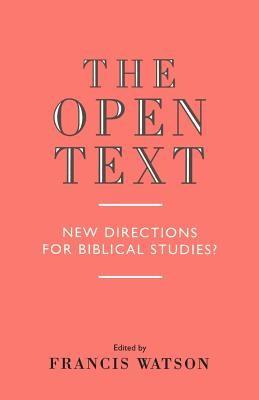
- We will send in 10–14 business days.
- Publisher: SCM Press
- ISBN-10: 0334022274
- ISBN-13: 9780334022275
- Format: 14 x 21.6 x 1 cm, softcover
- Language: English
- SAVE -10% with code: EXTRA
The Open Text (e-book) (used book) | bookbook.eu
Reviews
Description
The essays in this collection arose out of a conference held at King's College, London in the spring of 1992. While the contributions do not deny the need for historical criticism and its lasting significance, they believe that it is no longer plausible to identify the results of such criticism with the full reality of the biblical texts. Other approaches are equally
legitimate and the new theoretical perspective must be pluralistic.
Factors determining the new situation are an acceptance of what is widely called a 'postmodern' condition, the recognition that the Bible is an 'open text' capable of many meanings, the development of a literary approach to the Bible and an emphasis on the importance of the role of the reader. All these issues are reflected in individual essays, by Mark Brett, Phyllis Trible, Werner Jeanrond, Frances Young, Stephen Moore, Stephen Barton, Richard Coggins and the editor.
The common threads which emerge from their contributions will prove of the utmost importance for biblical studies in the future, and may well provide a chart of the new courses that it will have to take.
EXTRA 10 % discount with code: EXTRA
The promotion ends in 20d.15:23:47
The discount code is valid when purchasing from 10 €. Discounts do not stack.
- Publisher: SCM Press
- ISBN-10: 0334022274
- ISBN-13: 9780334022275
- Format: 14 x 21.6 x 1 cm, softcover
- Language: English English
The essays in this collection arose out of a conference held at King's College, London in the spring of 1992. While the contributions do not deny the need for historical criticism and its lasting significance, they believe that it is no longer plausible to identify the results of such criticism with the full reality of the biblical texts. Other approaches are equally
legitimate and the new theoretical perspective must be pluralistic.
Factors determining the new situation are an acceptance of what is widely called a 'postmodern' condition, the recognition that the Bible is an 'open text' capable of many meanings, the development of a literary approach to the Bible and an emphasis on the importance of the role of the reader. All these issues are reflected in individual essays, by Mark Brett, Phyllis Trible, Werner Jeanrond, Frances Young, Stephen Moore, Stephen Barton, Richard Coggins and the editor.
The common threads which emerge from their contributions will prove of the utmost importance for biblical studies in the future, and may well provide a chart of the new courses that it will have to take.


Reviews